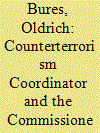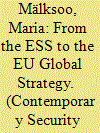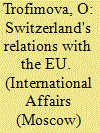| Srl | Item |
| 1 |
ID:
188048


|
|
|
|
|
| Summary/Abstract |
Both national and EU officials have repeatedly emphasized the need for a comprehensive and strongly coordinated EU counterterrorism policy in order to bring together the disparate measures taken by the member states, avoid duplication of action, involve uninterested member states, and to present the EU as a coherent counterterrorism actor. To address these concerns, the EU member states agreed to create the position of an EU Counterterrorism Coordinator in 2005, only to be followed in 2016 with the position of an EU Commissioner for Security Union. A question therefore arises as to whether the EU needs two counterterrorism coordinators. This article addresses this question by utilizing Pierre Bourdieu’s concepts of field, capital, doxa, and habitus and argues that there is no apparent rationale for the coexistence of two EU Counterterrorism Coordinators with an overlapping mandate and minimal material, similar cultural and vastly disparate symbolic capital.
|
|
|
|
|
|
|
|
|
|
|
|
|
|
|
|
| 2 |
ID:
147921


|
|
|
|
|
| Summary/Abstract |
Producing a Global Strategy document for the European Union is a pretty complex exercise in multilateral diplomacy. Those who drafted the EUGS undoubtedly found themselves engaged in a consensus-building operation that inevitably results in toning down one version of the document after another until all member states are satisfied. With much sympathy for the authors and for the key coordinator’s efforts in particular, my remarks will be based on the resulting document.
|
|
|
|
|
|
|
|
|
|
|
|
|
|
|
|
| 3 |
ID:
148299


|
|
|
|
|
| Summary/Abstract |
Security strategies are important sites for narrating the EU into existence as a security actor. The unveiling of a new global strategy on foreign and security policy for the EU immediately post-Brexit could be conceived as a pledge to remain together as a Union for the purposes of contributing to global security in a particular way. This paper offers a brief stock-taking of the EU’s way of writing security from the European Security Strategy (2003) to the EU Global Strategy (2016). A concise exegesis of these documents exposes an interesting dynamic: as exercises in ordering the world, both strategic guidelines have turned out to be major exercises in ordering the self. The comparative snapshot shows the EU as increasingly anxious to prove its relevance for its own citizens, yet notably less confident about its actual convincingness as an ontological security framework for the EU’s constituent members over time.
|
|
|
|
|
|
|
|
|
|
|
|
|
|
|
|
| 4 |
ID:
164203


|
|
|
|
|
| Summary/Abstract |
SWITZERLAND holds a special place in Europe. It has one of the world's most stable and competitive economies, which uses the cluster model of organization and is based on sectors that have traditionally given competitive advantages to Switzerland such as high-tech industries, including the manufacturing of watches and precision machinery, the pharmaceutical industry, the manufacturing of some food products, and the service sector. Switzerland owes these advantages to customization for specific clienteles, to a relatively large share of capital-intensive and high-tech products in its total output, to high-standard after-sales service, to its convenient geographical location, and to the effective use of resources, and to the Swiss national character with its self-discipline and sense of responsibility. Switzerland's best-performing sectors are industries that need skilled labor and relatively low inputs of raw materials, and are chiefly export-oriented.
|
|
|
|
|
|
|
|
|
|
|
|
|
|
|
|